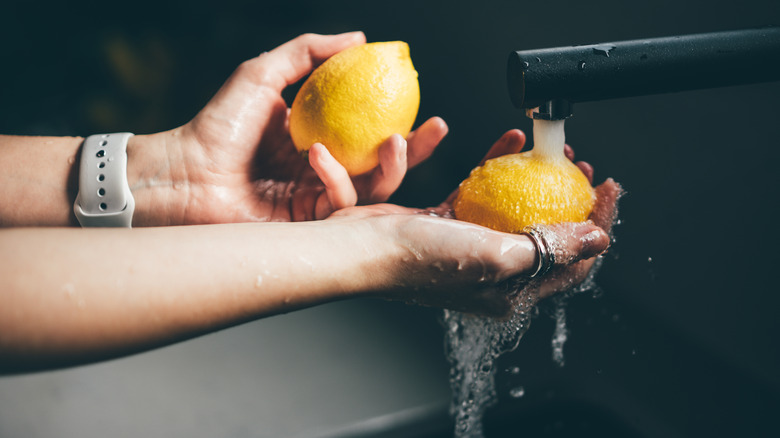The First Thing To Do Before Infusing Olive Oil With Fresh Lemons
One of life's greatest food pleasures is also among the simplest: Sopping up olive oil with a piece of crusty bread. Of course, there are more complex applications for that golden liquid fat; it's a lively base for salad dressing or pesto, an herbaceous bath that elevates almost any seafood, and a flavorful swap for butter when baking. And while wonderful in its purest form, sometimes it's worth infusing olive oil with fresh produce or herbs for a more animated bite. Lemon brings a citrusy brightness to oil that's typically characterized by an earthy depth but don't just go shoving peels into your bottle at home. Before you begin steeping, it's imperative to thoroughly wash the fruit.
The part of the lemon that you'll infuse the oil with is the skin — typically the zest of two lemons (preferably organic). That outer layer is, of course, most vulnerable when it comes to contamination. If you're not using organic fruit, the peel may be coated in pesticides, and the surface of any lemon could have come into contact with bacteria or, while in transit, dirt. Substances on the exterior that aren't washed off will end up in the olive oil, which not only taints the flavor but could make it harmful to consume.
Wash, but avoid the soap
Before cleaning the lemons, always wash your hands for at least 20 seconds. Then, use a firm produce brush to scour the fruit under running water and pat it dry. While some cooking websites instruct home chefs to use soap, the Food and Drug Administration advises against that because fruits and vegetables are porous and could absorb any cleansing solution. The agency warns that soap residue would likely remain even after a vigorous rinse and can cause illness when ingested.
Once clean, zest the lemon — whether you go with larger strips or minced bits is up to you, just avoid using the spongy white pith, which will turn the final blend bitter. Heat the peel and the oil in a saucepan over low until the liquid begins to gently bubble, remove from the burner and allow the mixture to steep for at least an hour. Finally, strain the oil to remove the zest and transfer it into a clean container.
Always store the infused product in the refrigerator rather than the pantry to help prevent it from going rancid and slow bacteria growth; it should keep for up to a month. Now that you've experienced a world where olive oil can take on new flavors, use your kitchen to experiment with other ingredients like black truffles or even cheese rinds for a savory take.

